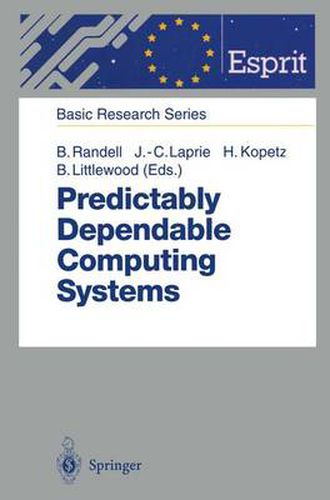Readings Newsletter
Become a Readings Member to make your shopping experience even easier.
Sign in or sign up for free!
You’re not far away from qualifying for FREE standard shipping within Australia
You’ve qualified for FREE standard shipping within Australia
The cart is loading…






This title is printed to order. This book may have been self-published. If so, we cannot guarantee the quality of the content. In the main most books will have gone through the editing process however some may not. We therefore suggest that you be aware of this before ordering this book. If in doubt check either the author or publisher’s details as we are unable to accept any returns unless they are faulty. Please contact us if you have any questions.
The first ESPRIT Basic Research Project on Predictably Dependable Computing Systems (No. 3092, PDCS) commenced in May 1989, and ran until March 1992. The institutions and principal investigators that were involved in PDCS were: City University, London, UK (Bev Littlewood), lEI del CNR, Pisa, Italy (Lorenzo Strigini), Universitiit Karlsruhe, Germany (Tom Beth), LAAS-CNRS, Toulouse, France (Jean-Claude Laprie), University of Newcastle upon Tyne, UK (Brian Randell), LRI-CNRS/Universite Paris-Sud, France (Marie-Claude Gaudel), Technische Universitiit Wien, Austria (Hermann Kopetz), and University of York, UK (John McDermid). The work continued after March 1992, and a three-year successor project (No. 6362, PDCS2) officially started in August 1992, with a slightly changed membership: Chalmers University of Technology, Goteborg, Sweden (Erland Jonsson), City University, London, UK (Bev Littlewood), CNR, Pisa, Italy (Lorenzo Strigini), LAAS-CNRS, Toulouse, France (Jean-Claude Laprie), Universite Catholique de Louvain, Belgium (Pierre-Jacques Courtois), University of Newcastle upon Tyne, UK (Brian Randell), LRI-CNRS/Universite Paris-Sud, France (Marie-Claude Gaudel), Technische Universitiit Wien, Austria (Hermann Kopetz), and University of York, UK (John McDermid). The summary objective of both projects has been to contribute to making the process of designing and constructing dependable computing systems much more predictable and cost-effective . In the case of PDCS2, the concentration has been on the problems of producing dependable distributed real-time systems and especially those where the dependability requirements centre on issues of safety and/or security.
$9.00 standard shipping within Australia
FREE standard shipping within Australia for orders over $100.00
Express & International shipping calculated at checkout
Stock availability can be subject to change without notice. We recommend calling the shop or contacting our online team to check availability of low stock items. Please see our Shopping Online page for more details.
This title is printed to order. This book may have been self-published. If so, we cannot guarantee the quality of the content. In the main most books will have gone through the editing process however some may not. We therefore suggest that you be aware of this before ordering this book. If in doubt check either the author or publisher’s details as we are unable to accept any returns unless they are faulty. Please contact us if you have any questions.
The first ESPRIT Basic Research Project on Predictably Dependable Computing Systems (No. 3092, PDCS) commenced in May 1989, and ran until March 1992. The institutions and principal investigators that were involved in PDCS were: City University, London, UK (Bev Littlewood), lEI del CNR, Pisa, Italy (Lorenzo Strigini), Universitiit Karlsruhe, Germany (Tom Beth), LAAS-CNRS, Toulouse, France (Jean-Claude Laprie), University of Newcastle upon Tyne, UK (Brian Randell), LRI-CNRS/Universite Paris-Sud, France (Marie-Claude Gaudel), Technische Universitiit Wien, Austria (Hermann Kopetz), and University of York, UK (John McDermid). The work continued after March 1992, and a three-year successor project (No. 6362, PDCS2) officially started in August 1992, with a slightly changed membership: Chalmers University of Technology, Goteborg, Sweden (Erland Jonsson), City University, London, UK (Bev Littlewood), CNR, Pisa, Italy (Lorenzo Strigini), LAAS-CNRS, Toulouse, France (Jean-Claude Laprie), Universite Catholique de Louvain, Belgium (Pierre-Jacques Courtois), University of Newcastle upon Tyne, UK (Brian Randell), LRI-CNRS/Universite Paris-Sud, France (Marie-Claude Gaudel), Technische Universitiit Wien, Austria (Hermann Kopetz), and University of York, UK (John McDermid). The summary objective of both projects has been to contribute to making the process of designing and constructing dependable computing systems much more predictable and cost-effective . In the case of PDCS2, the concentration has been on the problems of producing dependable distributed real-time systems and especially those where the dependability requirements centre on issues of safety and/or security.